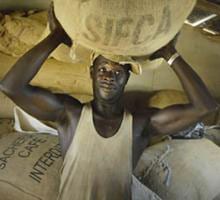The situation in Ivory Coast and Liberia has descended into a huge humanitarian disaster which requires urgent international funding, a coalition of 13 aid agencies has warned today.
The situation in Ivory Coast and Liberia has descended into a huge humanitarian disaster which requires urgent international funding, a coalition of 13 aid agencies has warned today.
 |
| The situation in Ivory Coast has descended into a humanitarian disaster. Photo: Tineke D’Haese/Oxfam-Soildarité. |
Despite recent political developments, the humanitarian emergency remains and the needs of people affected by extreme fighting continue to escalate. The crisis is far from over in Ivory Coast, agencies say, and will require international attention for months to come. Funding is desperately needed to provide life-saving aid and to rebuild shattered communities, but the humanitarian aid pledged so far has fallen dangerously short.
The conflict in Ivory Coast has already displaced more than one million people from their homes and forced around 135,000 refugees to flee to Liberia. People made homeless by violence are now in desperate need of food, water, shelter, sanitation and protection. The majority of the displaced are children, many of whom are at risk from disease and hunger.
Guy Cave, Save the Children’s Country Director for Ivory Coast said: “According to our staff on the ground, displaced children and their families are living in terrible conditions in Duekoué. There are no proper toilets and a huge lack of water, so people can’t keep clean. There is massive overcrowding and people have nowhere to sleep. The risk of disease spreading is acute. This is a catastrophic situation and children need urgent help.”
Displaced people and refugees are mostly living with relatives or in strangers’ homes, causing a major stress on local food supplies. In Liberia, aid agencies are reporting a near-exhaustion of food stocks, families reducing their food consumption to one meal per day, and major increases in the price of rice and cassava in local markets. Scattered in remote and dense forest border areas between Ivory Coast and Liberia, a huge number of refugees remain incredibly vulnerable and out of reach of life-saving relief.
Tariq Riebl, Oxfam’s Humanitarian Manager in Liberia said: “Many refugees we are working with are too afraid to return home any time soon. The crisis has also severely affected the incomes of families. This is a humanitarian crisis that is likely to continue for months to come. We need to urgently expand our response to meet the escalating needs in Ivory Coast and Liberia but without the funds tens of thousands of people will go without help.”
The coalition is calling for funding to increase rapidly to meet the growing humanitarian needs on the ground both in Ivory Coast and Liberia, which will continue for months to come. So far funding has been inadequate. The US$146.5million UN humanitarian appeal for Liberia has received just 29 per cent of the funds requested, while a new US$160million appeal for Ivory Coast has received only 18 per cent. Unless funding is dramatically scaled up, the needs of tens of thousands of people will remain unmet.
Vincent Taillandier, Desk Officer for Action Contre la Faim just back from Ivory Coast said: “In addition to a huge displacement of the population, there is a major problem with a lack of critical supplies. Health centres, for example, are without any drugs or therapeutic food to treat malnutrition. Medical staff are in place, but are no longer receiving their wages and feel powerless without the medical equipment they need to treat their patients. It is essential to get health centres they provisions they need.”
The coalition also urges donors to ensure aid is delivered to those most in need. Concrete and coordinated measures must be taken to preserve neutral, impartial and independent humanitarian action, and further aid pledges must be delivered according to proper needs assessments on the ground.
“On the Ivory Coast-Liberia border, people seeking refuge are saying they are exhausted and in desperate need of assistance. Most vulnerable are isolated women, children, the elderly and disabled persons who require specific support, such as psychosocial and medical services. The international community must ensure that humanitarian aid is impartial and reaches all who need it regardless of location or political affiliation,” said Laurent Davy, Programme Manager for Ivory Coast and Liberia at Handicap International.
The coalition calls upon the humanitarian donor community to:
- Urgently increase their funding to enable aid agencies to meet the needs of displaced people in Ivory Coast and refugees in Liberia, as well as affected neighbouring countries;
- Ensure funding allocations are made transparently and equitably to ensure that needs are met across the country.
The coalition calls upon the UN and the international humanitarian system to:
- Ensure military and humanitarian response are distinguished to preserve neutral, impartial and independent humanitarian action;
- Take adequate measures to ensure humanitarian access to all affected populations, regardless of ethnicity, religion or perceived political alignment.



